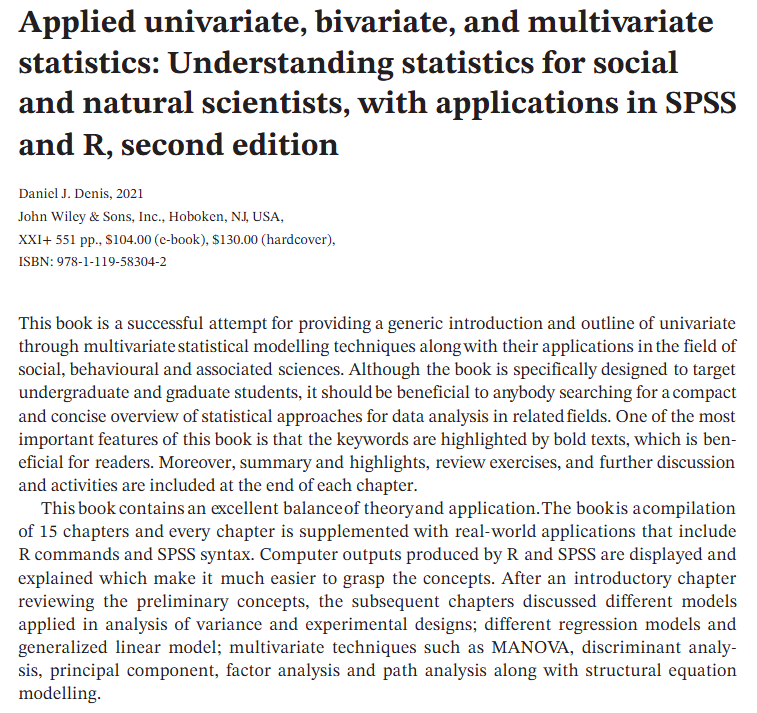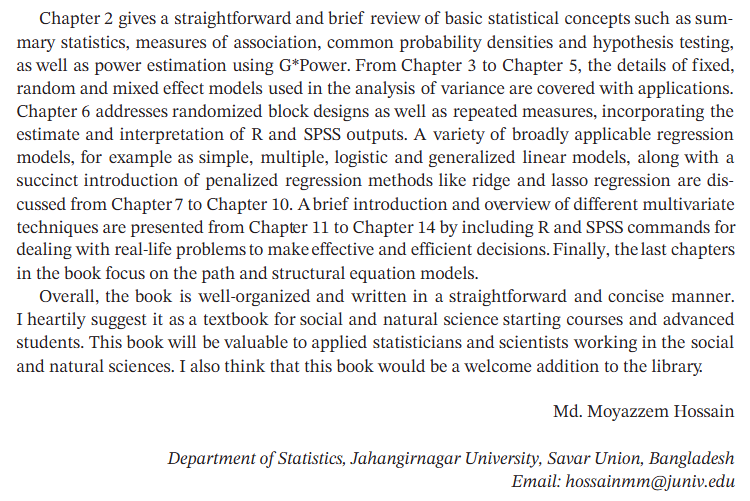
 About the Author Daniel J. Denis, Ph.D has served as Professor of Quantitative Psychology at the University of Montana since 2004 where he has taught numerous courses in advanced statistics to students in the social and natural sciences. He has also served as reviewer for journals such as Psychological Methods, BMC Medicine, International Statistical Review, Journal of Modern and Applied Statistical Methods, European Journal of Research Methods in Behavioral and Social Sciences, and Statistical Science of the Institute of Mathematical Statistics, among others. He has consulted in a variety of fields such as legal, medical, and social science more generally and has served as Expert Witness to the District Court of the United States. His teaching philosophy is to help and challenge students to think on their own so that they become independent, critical consumers and producers of knowledge rather than blindly following the status quo. Good science is about challenging the status quo, not blindly submitting to it or uncritically trusting authority. The purpose of education should be to learn how to think analytically, critically and ethically, not simply memorize and regurgitate material found in textbooks. His research interests, both academic and professional, include the dissemination and teaching of applied behavioral statistics and experimental design through the use of analytical, practical, philosophical, and historical insights, emphasizing foundations and how these tools should be effectively and ethically used in the evaluation of scientific findings. His goal is to help students see through the verbiage and marketing of quantitative methods to learn what is really there underlying the "glitter". What is machine learning? How exactly does a machine "learn"? What is really going on at a more foundational technical level? Expertise in an area implies seeing through the presumed complexity of what is advertised and marketed to get to the simple ingredients and concepts that make the methodology "tick" and are at their very foundation; cut through the smokescreen and see what's really going on behind the fancy words. Advanced procedures are often misunderstood due to a lack of understanding and appreciation for such foundations. If you are a prospective student interested in working with Dr. Denis in the Experimental Psychology Program at the University of Montana, or would like to receive educational mentorship, please contact him directly at daniel.denis@umontana.edu or via his faculty page at the University of Montana.
Understanding
how
statistical
models work
and function
is vital to
understanding
research that
is driven by
statistical
methods.
Understanding
the
fundamental
statistical
and
philosophical
foundations
that precede
the
application of
quantitative
tools is
paramount for
understanding
how the
statistical
methodologies
are being
applied in a
given
situation, and
whether that
application is
valid and
ethical.
Mathematical
statisticians
(bless them!)
and others
have provided
science with
exceptional
tools, and it
is essential
that students
learn how to
successfully
(and
ethically)
incorporate
that wealth of
mathematics
into their
scientific
endeavors and
applications.
Too often,
this
incorporation
is done
recklessly
with
insufficient
knowledge of
what the
statistical
method can vs.
cannot tell
you about your
data.  Coming in 2025 . . . Multivariate Statistics and Machine Learning: Applied Data Science Using R and Python Daniel J. Denis, Ph.D. (Routledge) 
|
 For
the better
part of the
last 10
years (since
2012 when I
received my
first book
contract with
Wiley), I have
been authoring
books on
applied
statistics for
the social and
natural
sciences
featuring R,
SPSS, and
Python
software. The
most
significant
and thorough
(and the one
I'm most proud
of and which
took an
inordinate
(mildly put)
amount of time
and effort) of
these projects
is
For
the better
part of the
last 10
years (since
2012 when I
received my
first book
contract with
Wiley), I have
been authoring
books on
applied
statistics for
the social and
natural
sciences
featuring R,
SPSS, and
Python
software. The
most
significant
and thorough
(and the one
I'm most proud
of and which
took an
inordinate
(mildly put)
amount of time
and effort) of
these projects
is 












